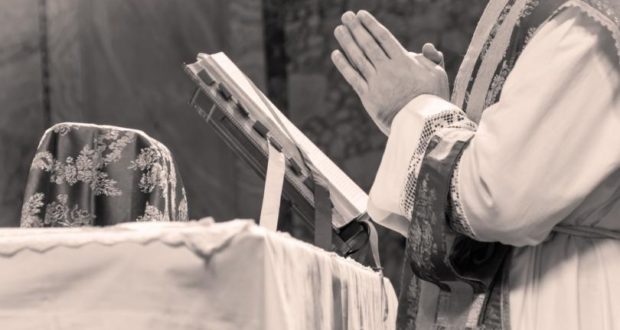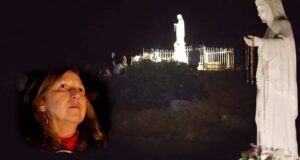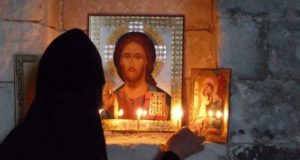الأساقفة الاسكتلنديون الكاثوليك: فوائد روحية واجتماعية ونفسية يوفرها استمرار القداس، ونطالب بأخذها في الاعتبار الكامل.. العبادة العلنية حق من حقوق الإنسان وواجب على البشرية تجاه الله.😞
ما الذي حدث ليحول الكثير من (المسيحيين) إلى جبناء؟ ومتى يتقدم الأساقفة إلى المحكمة الأوروبية لحقوق الإنسان؟ ✔
أتمنى أن يحب كاثوليك اسكتلندا القداس أكثر مما يخشون (خطر ضئيل) بالموت.. ورغم من عدم وجود دليل على إصابة أي شخص في اسكتلندا بالعدوى في الجماهير العامة منذ استئنافها في منتصف يوليو. 👌
إدنبرة ، اسكتلندا ، 7 يناير 2021 (LifeSiteNews) – أعتقد أنني انتهكت قانونًا أمس. (DOROTHY CUMMINGS MCLEAN)
لست متأكدا. ربما انتهكت للتو قاعدة. أو فشل في اتباع نصيحة الحكومة. على أي حال ، ذهبت إلى قداس عيد الغطاس، معتقدة أنها ستكون فرصتي الأخيرة لحضور القداس شخصيًا لأسابيع. لم يكن لدي أي فكرة عن تعليق العبادة العامة من الساعة 12:01 صباحًا ذلك الصباح ، ولا أعتقد أن الكاهن فعل ذلك أيضًا.
في وقت سابق من هذا الأسبوع ، أعلن الوزير الأول أن العبادة العامة في اسكتلندا لن يُسمح بها حتى 2 فبراير. لقد أبلغت عن ذلك على النحو الواجب ، وعندما رأيت أخبارًا تفيد بأن الحظر لم يدخل حيز التنفيذ حتى يوم الجمعة ، 8 يناير ، أرسلت تصحيحًا إلى مدقق.
بحلول ذلك الوقت ، كتب عضو البرلمان الإنجليزي المحافظ ، السير إدوارد لي (Sir Edward Leigh)، رسالة إلى الوزير الأول يشير فيها إلى أن حظر العبادة الدينية دون دليل على أنها تشكل تهديدًا للصحة العامة يعد انتهاكًا للمادة 9 من الاتفاقية الأوروبية لحقوق الإنسان. أضاف الأساقفة الاسكتلنديون الكاثوليك احتجاجهم المعتدل ، الذي يستحق الاقتباس بإسهاب
… نشعر بالحيرة أيضًا من القرار ، نظرًا لأن الإجراءات الصارمة التي تم اتخاذها منذ مارس الماضي لضمان السلامة العامة في كنائسنا كانت فعالة. لم يتم تقديم أي دليل يبرر إدراج دور العبادة كمصادر للعدوى. بدون هذه الأدلة العلمية ، ستبدو هذه القيود للكاثوليك تعسفية وغير عادلة. علاوة على ذلك ، فإن عددًا كبيرًا من القطاعات الأخرى التي تم تقييدها بالمثل في مارس الماضي إلى جانب العبادة العامة – مثل البناء والتصنيع ورياضات النخبة – تُركت الآن حرة لمواصلة العمل.
نلاحظ أيضًا أنه في إنجلترا ، تم اعتماد المساهمة الأساسية للعبادة العامة في الرفاهية الروحية لجميع المواطنين خلال هذه الأزمة بقرار عدم إغلاق أماكن العبادة بينما تراجعت الحكومة الاسكتلندية على ما يبدو عن هذا الرأي ، مما تسبب في الفزع. والارتباك.
نحن ندرك جيدًا خيبة الأمل التي ستسببها عمليات الإغلاق هذه ليس فقط لمجتمعنا الكاثوليكي ، ولكن للعديد من إخواننا المسيحيين وتلك المنتمين إلى ديانات أخرى في اسكتلندا. نود التأكيد مرة أخرى على الفوائد الروحية والاجتماعية والنفسية التي يوفرها استمرار العبادة العامة ، ونطالب بأخذها في الاعتبار الكامل في القرارات المستقبلية. العبادة العلنية حق من حقوق الإنسان وواجب على البشرية تجاه الله. بشكل ملموس ، يحتاج الكاثوليك إلى الإفخارستيا واللقاء الأسري مع الرب كضرورة لرفاههم الروحي وخلاصهم النهائي.
بينما نتشارك بشكل لا لبس فيه الهدف المشترك المتمثل في حماية الصحة العامة ، فإننا نحث الحكومة الاسكتلندية ، عند مراجعة التدابير الحالية في وقت لاحق في يناير ، على إعادة النظر في هذه القيود في ضوء المخاوف المذكورة أعلاه.
ولكن بدلاً من إعادة النظر ، رفعت الحكومة الاسكتلندية في وقت متأخر من ليلة الثلاثاء الحظر المفروض على العبادة العامة إلى يوم الأربعاء ، مما ترك الكاثوليك عرضة لغرامة قدرها 60 جنيهًا إسترلينيًا لحضور قداس عيد الغطاس. أتساءل عما إذا كانت الحكومة الاسكتلندية قد علمت للتو أن هناك قداس عيد الغطاس ، وأن 6 يناير هو عادة يوم مقدس للالتزام في اسكتلندا ، أو أن الناس المتدينين لا يقيدون شعائرهم الدينية العامة في عطلة نهاية الأسبوع…
كل شيء جبان جدا. هناك اسكتلنديون كاثوليك خائفون من الفيروس لدرجة أنهم يفضلون ألا يذهب أي شخص على الإطلاق إلى القداس ، على الرغم من عدم وجود دليل على إصابة أي شخص في اسكتلندا بالعدوى في الجماهير العامة منذ استئنافها في منتصف يوليو. سيكون من الغريب بالتأكيد أن يكون هناك: لمدة خمسة أشهر ، اجتمع معظم الكاثوليك الذين يذهبون إلى الكنيسة في اسكتلندا في كنائس جيدة التهوية مبنية لـ 200 أو أكثر في مجموعات من 40، مقنعين ، أيديهم معقمة عند الباب ، يصلون على بعد ستة أقدام على الأقل من تدخل كل مجموعة منزلية من باب واحد وتخرج من باب آخر. حتى أن بعض الأبرشيات عانت من المتطوعين العلمانيين المتحمسين المفرط الذين غضبوا عن مخالفات مشتبه بها ، مما أدى إلى نفور الكاثوليك الذين لا يحبون أن يكونوا ملاحقين في القداس، من قبل الجواسيس..
أوه نعم ، كان هناك جاسوس. هذه المرأة غير السارة – أو ربما المزعجة فقط – ستأتي إلى الكنيسة لتحصي أعدادنا.. أشعر بالخجل من أن أقول إنها هي أيضًا كاثوليكية ، ولم يكن سلوكها شيئًا أتوقعه في بلد تعرضت فيه الكاثوليكية للقمع الوحشي لمدة 233 عامًا ومن ثم التهميش لمدة 200 سنة أخرى.
اعتبارًا من 26 ديسمبر ، أُجبر رواد الكنيسة الاسكتلندية على خفض أعدادنا إلى النصف إلى 20 ، وقد تعامل كاهن أعرفه قداسًا ثانيًا في الخامسة مساءً…
أقول لم أتوقع أن يحدث أي شيء كهذا في حياتي. لقد تلقيت سر التثبيت قبل السقوط المفاجئ لجدار برلين ، وبينما كنت أفكر في مسؤولياتي الجديدة ، قررت أنها تشمل المخاطرة بالتعرض للاستشهاد على يد الغزاة الشيوعيين. على الرغم من تعليمي الكاثوليكي العادي في الثمانينيات ، فقد قرأت الكثير عن الشهداء ، واعتقدت أن تاج الشهداء يستحق أي مكروه يمكن أن نعانيهو. اليوم يخطر لي السؤال حول تجريم السلطة المدنية يومًا ما العبادة العامة.
ما لم يخطر ببالي هو أن هذا يمكن أن يحدث في ديمقراطية غربية.. لكن المفاجأة الأسوأ هي أن هناك كاثوليك خائفون جدًا من الموت في غضون بضعة أشهر من مرض الجهاز التنفسي (بدلاً من بضع سنوات أخرى من السرطان أو قصور القلب أو الخرف أو الالتهاب الرئوي) لدرجة أنهم يعارضون بشدة إعادة فتح الكنائس لأي شخص ، حتى في حالة عدم وجود دليل على أن العبادة العامة ، التي تتم في الظروف المذكورة أعلاه ، تنشر المرض. يبدو هذا الرعب غريبًا في الأشخاص الذين يزعمون أنهم يؤمنون بخلود النعيم بعد الموت.
“أي خطر ، مهما كان صغيراً ، يجب تجنبه” كتبه أحد زملائي الكاثوليك ، دون خجل على ما يبدو. هل نسيت كل مسيحيي الشرق الأوسط الذين خاطروا (وفقدوا) حياتهم بانتظام لحضور العبادة العامة خلال حياتها؟ هل نسيت ما كان شهداء الشيوعية السوفياتية على استعداد للمخاطرة به من أجل المسيح؟ هل تعتقد أن الكنيسة السرية في الصين ، في الواقع ، تطلب ذلك فقط؟ وهل هي غير حساسة تمامًا لآلام زملائها الأسكتلنديين في ضائقة شديدة لأن القبول المنتظم للافخارستيا هو الشيء الوحيد الذي يقف بينهم وبين الانهيار العقلي؟
من عام 1613 حتى اعتقاله في عام 1614 ، احتفل القديس جون أوجيلفي ، وهو كاهن يسوعي ، بقداس تحت الأرض للكاثوليك الأسكتلنديين الشجعان. كان قطيعه على استعداد للمخاطرة بالسجن ، والغرامات الباهظة ، والرفاهية من أجل حضور القداس. دخل قانون الإغاثة الكاثوليكية حيز التنفيذ في اسكتلندا عام 1793 ، مما أعفينا من مثل هذه العقوبات ، على الرغم من التحيز ضد الكاثوليكية استمر في القرن العشرين. ما الذي حدث منذ ذلك الحين ليحول الكثير منا إلى جبناء؟ ومتى يتقدم الأساقفة إلى المحكمة الأوروبية لحقوق الإنسان؟
I wish more Catholics in Scotland loved Mass more than they fear (a tiny risk of) death
There are Catholic Scots who are so frightened of the virus that they would rather nobody at all went to Mass, even though there is no evidence that anyone in Scotland has been infected at public Masses since they resumed in mid-July.
Dorothy Cummings McLean is a Canadian journalist, essayist, and novelist. She earned an M.A. in English Literature from the University of Toronto and an M.Div./S.T.B. from Toronto’s Regis College. She was a columnist for the Toronto Catholic Register for nine years and regularly contributes to Catholic World Report. Her first book, Seraphic Singles, was published by Novalis (2010) in Canada, Liguori in the USA, and Homo Dei in Poland. Her second, Ceremony of Innocence, was published by Ignatius Press (2013). Dorothy lives near Edinburgh, Scotland with her husband.
EDINBURGH, Scotland, January 7, 2021 (LifeSiteNews) — I think I broke a law yesterday.
I’m not sure. Maybe I just violated a rule. Or failed to follow government advice. At any rate, I went to Epiphany Day Mass, thinking it would be my last opportunity to attend Mass in person for weeks. I had no idea that public worship had been suspended from 12:01 AM that morning, and I don’t think the priest did either.
Earlier this week, the First Minister announced that public worship in Scotland would not be permitted until February 2. I duly reported this, and when I saw news that the ban did not come into effect until Friday, January 8, I sent a correction to an editor.
By then an English Conservative MP, Sir Edward Leigh, had written a letter to the First Minister pointing out that banning religious worship without evidence it was a threat to public health is a violation of Article 9 of the European Convention on Human Rights. The Scottish Catholic bishops added their mild protest, worth quoting at length
… [W]e are also perplexed by the decision, given that the stringent measures taken since last March to ensure public safety in our churches have been effective. No evidence has been forthcoming to justify the inclusion of places of worship as sources of infection. Without such scientific evidence these restrictions will appear to Catholics to be arbitrary and unfair. Moreover, significant number of other sectors similarly restricted last March alongside public worship – such as construction, manufacturing and elite sports – have now been left free to continue in operation.
We also note that, in England, the essential contribution of public worship to the spiritual welfare of all citizens during this crisis has now been endorsed by the decision not to close places of worship while the Scottish Government has apparently retreated from this view, causing dismay and confusion.
We are very aware of the disappointment these closures will cause not only to our own Catholic community, but to many of our fellow-Christians and those of other faiths in Scotland. We wish to emphasise again the spiritual, social and psychological benefits provided by continuing public worship, and we ask for these to be taken into full account in future decisions. Public worship is a human right and is a duty humanity owes to God. More concretely, Catholics need the Eucharist and the Sacramental encounter with the LORD as necessary to their spiritual wellbeing and their ultimate salvation.
While we unequivocally share the common goal of protecting public health, we urge the Scottish Government, when the present measures are reviewed later in January, to reconsider these restrictions in the light of the above concerns.
But instead of reconsidering, late on Tuesday night the Scottish Government moved up the ban on public worship to Wednesday, thus leaving Catholics at risk of a £60 fine for attending Epiphany Mass. I wonder if the Scottish government had only just learned that there was an Epiphany Mass, and that January 6 is usually a Holy Day of Obligation in Scotland, or that religious folk don’t restrict their public religious observances to the weekend. Naturally, I also wonder if this was their way of showing the Auld Kirk who is boss.
I must say, learning about the late-night date-switch made me very cross, and I hadn’t enjoyed a lengthy period of good mood to begin with. Sir Edward Leigh’s fraternal intervention—he is the President of the Catholic Union of Great Britain—was taken with ill grace by those Catholic Scots whose hatred for English “Tories” far outweighs their love for the Holy Sacrifice of the Altar. I had been reading their thoughts, and the thoughts of other Catholic Scots who believe more in the efficacy of the lockdowns than in the unique virtues of public worship, with deep shame.
It’s all so cowardly. There are Catholic Scots who are so frightened of the virus that they would rather nobody at all went to Mass, even though there is no evidence that anyone in Scotland has been infected at public Masses since they resumed in mid-July. It would surely be strange if there was: for five months most church-going Catholics in Scotland assembled in well-ventilated churches built for 200 or more in groups of 40, masked, hands sanitized at the door, praying at least six feet apart from each household group, entering through one door, leaving through another. Some parishes even suffered from over-enthusiastic lay volunteers who hissed at suspected infractions, alienating Catholics who dislike being nannied at Mass. My community was more fortunate: we had just one mild-mannered (if large) young man to tick off names on the reservation list, give instructions, and watch the spy.
Oh yes, there was a spy. This unpleasant—or perhaps just disturbed—woman would come into the church to count our numbers and report to goodness knows whom. I am ashamed to say that she, too, is a Catholic, and her behavior was not something I expected in a country where Catholicism was brutally oppressed for 233 years and then marginalized for 200 more.
As of December 26, Scottish churchgoers were forced to halve our numbers to 20, and one priest I know coped with that by saying two short Masses in the same time it usually takes him to say one. He had already added a 5pm Mass. On that first Sunday Mass of 20, I kept looking over my shoulder to see if the spy had sneaked in to count.
It would be untrue to say that I never expected anything like this to happen in my lifetime. I received the sacrament of Confirmation before the sudden fall of the Berlin Wall, and while pondering what my new responsibilities might entail, I decided they included running the risk of being martyred by Communist invaders. Despite my ordinary 1980s Catholic education, I had read a lot about the martyrs, and I believed a martyr’s crown was worth any unpleasantness Mr Chernenko could devise. So, yes, it has occurred to me that a civil power might one day criminalize public worship.
What did not occur to me was that this could happen in a Western democracy, especially one that should be chastened by its long history of oppressing and marginalizing religious minorities. But an even worse surprise is that there are Catholics so frightened of dying in a few months of a respiratory illness (instead of in a few more years of cancer, heart failure, dementia or pneumonia) that they are firmly opposed to re-opening their churches to anyone, even when there is no evidence that public worship, carried out in the above-mentioned circumstances, spreads the disease. This terror seems strange in people who purport to believe in an eternity of bliss after death.
“Any risk, no matter how small, must be avoided” typed one of my fellow Catholics, apparently without shame. Had she forgotten all the Middle Eastern Christians who have regularly risked (and often lost) their lives to attend public worship during her lifetime? Had she forgotten what the martyrs of Soviet Communism were willing to risk for Christ? Does she think the underground Church in China is, in fact, just asking for it? And is she completely insensitive to the pain of fellow Scots in great distress because regular reception of the Eucharist is the only thing standing between them and mental collapse?
From 1613 until his arrest in 1614, St. John Ogilvie, a Jesuit priest, celebrated underground Masses for courageous Scottish Catholics. His flock were willing to risk prison, heavy fines, and the rack for the sake of attending Mass. The Catholic Relief Act came into effect in Scotland in 1793, sparing us from such punishments, although anti-Catholic prejudice carried on into the 20thcentury. What has happened since then to turn so many of us into cowards? And when will the bishops apply to the European Court of Human Rights?
 Agoraleaks Agoraleaks
Agoraleaks Agoraleaks







